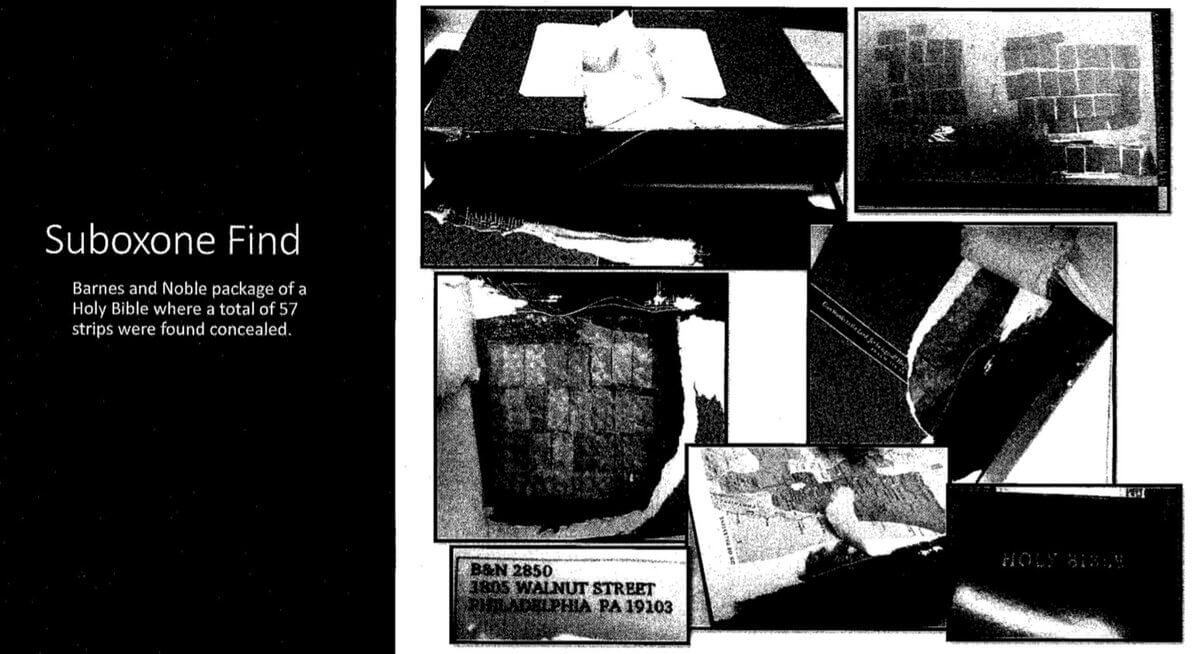The Pennsylvania Department of Corrections (DOC) this week lifted a systemwide prison lockdown put in place after dozens of guards were sickened by exposure to synthetic cannabinoids. But instead of a lockdown, stiffer new prison rules will be in place, in part to curb the drug smuggling in state prisons that led to some 50 guards and 33 inmates falling ill between May 31 and Sept. 5.
According to the DOC, toxicology and lab tests confirmed in multiple instances that prison staff was exposed to synthetic cannabinoids (known to some as K2, which has had reported severe mental health and even deadly effects for many users). Inmate overdoses during that time were caused by the same drugs, tests found.
Changes include requiring that all non-legal mail be sent to a processing center and cataloged in a database that will be maintained going back seven years. Photocopies of letters or photos will be forwarded to inmates. Originals will be destroyed. Legal mail will be opened by prison staff in front of inmates, photocopies will be given to the inmates, and the originals will be destroyed.
“The reason behind the new policy on publications and mail coming into the DOC system is to shut down major avenues for drug (and other contraband) smuggling into DOC facilities to protect staff and inmates,” DOC spokeswoman Amy Worden said via email. She also provided a photograph of a Holy Bible shipped to a prison and found to contain 50 strips of Suboxone in the binding as evidence of the security concerns associated with books mailed into prisons.

But some inmate advocates say the new prison rules go too far, and could raise significant privacy concerns.
“These policies are very degrading, very dehumanizing, and they seek only to punish and control,” said Sean Damon, a paralegal and organizer at Amistad Law Project, which on Sept. 14 is organizing a call-in to protest the new policies to state leaders. “One of the deep concerns here is, how does this affect the mental health of people who are incarcerated?”
Another change: the DOC will now handle all book orders, effectively ending the work of programs like Books Through Bars, a Philly-based program that sends free, donated books to inmates.
“Books Through Bars tries to undo a small part of the dehumanization that incarceration inflicts by sending free books that help people in prison pass the time, stay sane, or learn new skills,” said Hannah Rich, a volunteer at Books Through Bars, in a statement the group released criticizing the new regulations. “If the restrictions remain in place, we will be unable to send reading material to thousands of people who seek to educate, heal, and transform themselves while incarcerated.”
The DOC is advising inmates to purchase ebooks for reading on tablet computers, but BTB volunteers said tablets, at $147 apiece, and ebooks are beyond the financial means of many inmates.
DOC said it plans to strengthen prison libraries, seek out tablets to lend to inmates, and is working out details to continue receiving book donations at a central distribution site where donated books can be received and evaluated before going to inmates.
“There is no intention to limit access to books or publications by inmates,” Worden said via email. “The DOC believes that inmates will have greater access to books as libraries are expanded, we introduce e-readers and distribute donated books more widely.”

New prison rules fight to keep drugs out
The DOC says all the new prison rules and changes are required for the safety of both inmates and prison staff. The last arrest on DOC grounds for drug smuggling was on Sept. 11, when a 57-year-old father from Maryland visiting his daughter at SCI Muncy was arrested after guards found a small amount of marijuana in his outer garment.
Pennsylvania State Corrections Officers Association (PSCOA) president Jason Bloom said the new regulations are very much needed, but he will wait to see if they are effective.
“The PSCOA takes the safety of our members very seriously. We are aware that there is a drug problem within the institutions and that we need to have the proper steps in place to eliminate drugs from every institution. Our members have extremely dangerous jobs but should not have worry about being exposed to toxic drugs which could result in the use of Narcan to save their life,” Bloom said in a statement. “Only time will tell if the new measures established by the Governor and Department of Corrections are making a difference inside the institutions. We will be watching very closely to make sure that our members are protected.”
Overall, the changes are forecast to cost about $15 million, the DOC said. That includes the first payment of $4 million a year to pay Smart Processing in Florida to evaluate, document, and forward photocopies of all non-legal mail. Other costs include $1.9 million to vet and copy legal mail, and $2.2 million for new drone security. New scanners to check staff and visitors for contraband will cost $4.5 million to bring body scanners to all 25 state prisons, $1.8 million for ion scanners, and $85,000 for printers.
“DOC hopes that over time the cost will be offset by fewer drug searches needed & fewer staff/inmate trips to emergency rooms for evaluation/treatment and less staff overtime in these areas,” Worden said.
Gov. Wolf’s office did not respond to requests for comment on the new prison rules by press-time. But Damon is hopeful that, if public demand builds, that the new regulations may be softened or amended.
“These policies are really limiting ways people have been in contact for years and years and years,” Damon said. “That feeling of ordering a book for a loved one, sending a handwritten note, that they can know their mom, sister, uncle, or a loved one touched, as far as Gov. Wolf and the DOC is concerned, that’s something they are just going to be done with, that’s a thing of the past.”
Changes at Pennsylvania prisons
All non-legal mail to Pennsylvania DOC inmates must now be sent to:
Smart Communications /PA DOC Inmate Name/Inmate Number
Institution Name
P.O. Box 33028
St. Petersburg, FL 33733
Other changes will include:
-New prison rules and more staffing in visiting rooms (a 90-day moratorium is currently in effect on inmates using vending machines or taking photos, permanent policies are still being evaluated)
-Stricter suspensions for visitors caught introducing contraband.
-Increased drone security, more body and Ion scanners
To report drugs in state prisons, call the DOC’s hotline: 717-728-4743 or 833-316-5003.

























